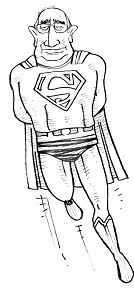(Editor’s note: This is the 2nd of 10 articles serializing Executive Editor Michael Ryan’s ebook YouRule: How Saving America Depends Entirely on You And What You Can Do About It.)
A Real Page-Turner
My poor high school civics teacher. Forty years later I remember everything about him, except anything he ever said.
A couple of us in class decided his drab delivery just had to be a Clark Kent-style alter ego, and at some point his super-hearing would detect a crisis somewhere in the world and he’d rip off his wire-rimmed glasses and fly out the window to our slack-jawed awe.
Alas, there was no crisis, there was no Super Teacher, and, hand to heart, his monotony and our indifference are the only two things I remember about high school civics. I have no notes or recollections of the class, save for a drawing in my yearbook that my fellow student sketched of Mr. Excitement in leotard and flying cape. It’s a remarkable caricature of both our teacher and of civics education gone bad.

Fast forward to the adult me, so many years later.
Here I am, sitting with Gregory Watson, all five senses at DEFCON 1 alert. I’ve flown halfway across the country to hear the absolute coolest civics lesson I, or you, will ever hear, and I don’t want to miss a speck of a quark of detail. “How did you celebrate?” I ask him with some whimsy, though I’m dying to know. Did he run the streets, pounding his chest, air horn blaring? Buy rounds at the bar? He won’t say, or perhaps really doesn’t remember. It’s driving me crazy.
Come on. How often do you meet someone who managed to almost single-handedly amend the Constitution of the United States of America?
You bet I was paying attention!
I’ll explore Watson’s true-to-life stunning accomplishment—performed in many of our lifetimes and right under our noses—in greater detail later, including what he finally admitted he did that fateful night in 1992 when his 27th Amendment to the Constitution was declared ratified. You’ll be flabbergasted at the breadth of the amendment’s journey, wending as it did far beyond any river’s length. And you’ll be astonished, as well, to see just who is standing at the amendment’s headwaters.
Suffice it to say, it’s a civics lesson unsurpassed in American history, perhaps in all antiquity. For now, there’s both a question and a message in Watson’s remarkable voyage. The question, of course, is why he isn’t a household name and why his quiet triumph isn’t ingrained in every schoolchild in America.
The message is simply this: Civics isn’t boring at all. It’s the furthest thing from it.
I finally learned that lesson well into adulthood, as a longtime journalist, editorial writer and editor whose themes have constantly come back to the majesty of liberty and the feral frontier of self-governance so expertly charted by the pioneers of our Constitution.
Actor Michael Douglas’ title character in the 1995 film The American President tries to make that very point to his painfully uninspired daughter. Lifting her bulky history book, he starts reading the Preamble to the Constitution: “We, the People, of the United States, in order to form a more perfect union …”
“See?” he proclaims. “Grabs you right off the bat. It’s a page-turner!”
Absolutely. Our Constitution features some of the most important writing in history. I made that argument—the prima facie case for American exceptionalism—as passionately as I could a few years ago to an assembly of eighth-graders. Afterward, a teacher admitted to me that the students had probably never heard the term “American exceptionalism” before. Well, there you go: How can you imbue the young with any kind of perspective without a heavy dose of this country’s special place in history?
Nor is it just schoolkids who don’t fathom the expression. Shortly after his election, President Barack Obama was asked in 2009 by a European journalist whether he subscribed to American exceptionalism as his predecessors had.
“I believe in American exceptionalism,” he answered, though quickly adding, “just as I suspect that the Brits believe in British exceptionalism and the Greeks believe in Greek exceptionalism.” With all due respect to the former president, his answer betrayed a deeply flawed understanding of the term, particularly for a U.S. president.
Next: Not even this president of the United States seemed to know what American Exceptionalism is. Do you?
About the Author
Michael F. Ryan is executive editor of The Heartlander, as well as a longtime newspaper journalist and editorial writer, frequent speaker, and author of the international novel The Last Freedom on Holocaust survivor Viktor Frankl.
His award-winning work has appeared in newspapers and magazines since the 1980s, as he has made a decades-long study of civic engagement and its decline.The full YouRule! ebook is available for 99 cents at either BookBaby or Amazon.

